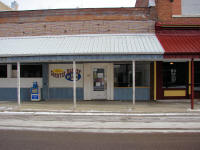 The property, originally used by the Atlanta Croquet Club before
being turned into a double store building, was the grounds where the
residents of the town contested their heated croquet matches. The property, originally used by the Atlanta Croquet Club before
being turned into a double store building, was the grounds where the
residents of the town contested their heated croquet matches.
For a while it was even discussed if those newfangled lights
should be added to the field to produce the opportunity for evening
matches in the heart of the city.
The need for commerce to grow in the ever-expanding community
took precedence, however, and croquet was relegated to the backyards
and fields of homes as Atlanta moved forward into a new century.
For a time in 2004, the store that had been a grocery since the
mid-1920s looked like it would not survive. The ever-increasing
movement of mobile consumers had continued to whittle away at sales.
People picking up groceries in the larger towns where they worked
was a big part of the problem. Bigger selection at bigger stores was
another.

When Homer and Rosalie Hamblin, after a lifetime of owning and
running the store, decided it was time to retire, buyers for a small
town grocery store in a hundred-year-old building were not exactly
lining up to bid on the business. Arguably, the store would have
closed save for the decision of Liz Hunter to buy the store and
continue the effort to offer neighborhood grocery service to the
town she had been a part of since the third grade.
Hunter remembers working at the store when she was a 16-year-old.
"I always had a fondness for this store," she related.
With the support of her husband, Dan, Liz now operates the store.
Although she has four part-time workers and Larry Vannoy, the
full-time butcher at the store for 33 years, Liz is the office
manager, clerk, cashier and stock boy in a store that immediately
brings someone back to the 1950s when entering.
The 15-foot ceilings carry a half dozen of the old two-bladed
fans still spinning slowly as they work to push the warm air back
down to the floor. Lanes between aisles are almost wide enough to
drive a truck through. Everything in the store has a small price
sticker affixed so there is no wonder or confusion to a buyer.
"There are no scanners in this store," Liz proudly boasts.

Like all small stores in small towns across America, Liz faces
challenges that make it hard to continue to operate a small
business. Continued increases in delivery costs, utility bills for
heating and cooling that continue to climb, and a pronounced
reduction in customers from the bustling days of another time and
era all take their toll on the viability of a small town businesses.
It took some time to interview Liz. Customers coming in took
precedence over chatting. Always there was a first-name rapport
between Hunter and her visitor. Always there was a moment to ask how
everyone in the family was doing.
In one case, a young woman with a small son purchased a few
items. Liz told the boy to make sure he told her two sisters she
said hello. The customers at the Atlanta Country Market are more
than just another face, another dollar.
One older man from Chestnut was there to buy cheese. His purpose
in coming to Atlanta was simple. He really likes their cheese, and
Larry, the butcher, knows exactly how to cut it for cheese sticks.
[to top of second column]
 |

There were more instances that showed this store as special. When
Liz mentioned the local pharmacy had closed, she noted that many
Atlanta residents now use her store for basic medicinal products. A
woman named Jackie, who Liz mentioned was an almost daily customer,
blurted out, "Oh, please don't close." Liz assured the woman our
conversation was not about closing but rather about how the store
could grow.
Of course there is a service aspect to a local store in any small
town. Some people don't or can't drive. Having a local store that
offers free delivery is almost an essential to them. Last-minute
failures to remember bread or cranberries or other condiments for a
soon-to- happen occasion make the store extremely handy, but it
needs to be more than that to survive.
To be sure, Liz isn't soured on the community. In fact, she loves
the town and the people. She beamed when she told of a summer
cookout where all the food was donated by the store, with the
proceeds of the rib-eye sandwiches going to the local grammar school
to be used as needed. "There were people lined up all down the block
that day," she said. "This town is so great at helping each other. I
believe that was one of the most memorable days in my life."

Without a doubt the meat department keeps the store's doors open.
"We only offer fresh meat products, and Larry will cut them any way
you want," she said. "I would rather run out of something than have
frozen meat in the store." One Atlanta resident advised that Larry's
daily chicken livers and gizzards "are to die for."
The prices on some things are a little higher, on others
reasonably close. That is to be expected in a small town grocery.
"We don't have the volume to become part of a grocery distribution
chain," she said, "so we do as best we can with the prices we can
get wholesale."
Liz wanted it known she has a competitive urge in her. "Check out
our Jack's pizzas," she said. "They are as cheap as anyone's. We
aren't that much higher than the bigger city stores, and when you
add in your time and gasoline, we are a lot more competitive than
most people think. It is perception that we have to fight as much as
the actual difference in prices."
Liz summed it up best when asked why she decided to take on this
store: "For some reason I knew that this was what I was supposed to
do."
Perhaps residents of Logan County can feel that same compelling
reflection and drop in from time to time and thank Liz for keeping a
part of our past alive. Maybe giving this store our support is
something we are supposed to do. We will drive great distances to
save a dollar. Perhaps we can drive a small distance to save a part
of our county's heritage. Downtown Atlanta is rebirthing itself. It
deserves to have a grocery store among its storied buildings.
[By Mike Fak]
Readers can find more of Mike Fak's writing at
www.searchwarp.com
and www.problogs.com.

|